Five years ago, scholars associated with the Political Theology Network launched a new book series, Transforming Political Theologies, published by Routledge. The aim of the series is “to expand the scholarly conversation about political theology by introducing national and regional contexts, religious traditions, scholarly methods, questions, and authorities that will transform the field, provincializing its origins and expanding its future possibilities.” The first books in the series have approached traditional figures like Augustine from new directions, examined political theology in new contexts like China, offered novel theological perspectives on current events like the Ukraine war, and built bridges with adjacent fields like peace studies.
In short, Transforming Political Theologies aims to offer models for the direction political theology is heading, models of the rigorous, interdisciplinary study of religion and politics, attentive to the complexity that always accompanies each of those terms. The series offers models of conversation beyond the applicative gesture, that is, when the scholars of religion simply borrow and apply the conclusions of other disciplines like sociology, history, or philosophy.
As a recent edited volume on political theology announced, “No longer is political theology a branch of Christian thought. No longer does it name the contested legacy of fascist legal theory. … Yet misconceptions (it’s Christian, it’s Nazi) about this burgeoning field remain prevalent.” To tackle such misconceptions, political theology needs more investigations on the questions, authorities, and sources beyond European and North American and beyond Christian contexts. It needs to turn its old habits inside-out. Here at the Political Theology Network and at our partner journal, Political Theology, we have been pushing in similar directions.
We asked authors and editors who have published in the Transforming Political Theologies series to share how they hope their books will transform political theology. From Colombia to South Africa, from a decolonial stance to trauma theory, these scholars have offered polysemous approaches to the political as well as the theological.
If you have a book project that you think might be a good fit for the Transforming Political Theologies series, don’t hesitate to contact editors Judith Gruber ([email protected]), Vincent Lloyd ([email protected]), and David True ([email protected]).
***

Janna Hunter-Bowman
Witnessing Peace: Becoming Agents Under Duress in Colombia, which emerges from participant action research in Colombia, transforms political theology with the notion of constructive agency under duress. The text centers the transformative efforts of Colombian communities directly impacted by compounded violence, spanning open armed conflict, the 2016 peace process, and the post-accord resurgence of direct violence.
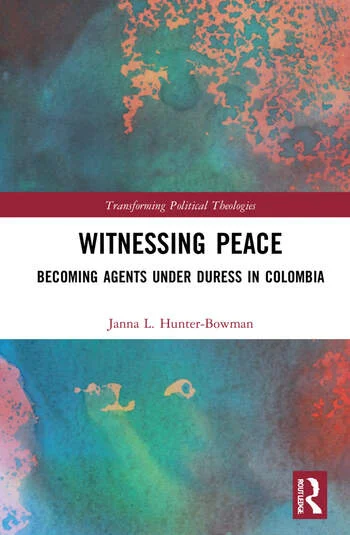
Unlike the notion of duress in moral theology—where constraints force cooperation with evil—here the focus is on what organized communities accomplish amidst threats and violence. The book uses principles of eschatology (as forms of time) to interpret the efforts of these agents to extend life and transform the compounded violence produced by colonial and neocolonial processes. Through the interplay of times, the corporate political agent participates in the resurrection of the dead and the recreation of the world.
In this interpretation, the emergent political order is rooted in relational peace, encounter, and interconnection, rather than on fear of violent death (as in Hobbes). The habit of celebrating Schmitt and Hobbes for founding “the political” on fear is a mistake if it restricts our imagination to a single political ontology—one rooted in a negative movement. In keeping with Latin American decolonial work emphasizing participation and multiple ontologies, this account confronts the ontology of fear by grounding the political in encounter, social bonds, and affect. The state is thus revealed as a contingent foundation and a permanently contested site, while the emphasis remains on the transformative processes that rise amidst vulnerability to keep justice, peace, and hope alive.
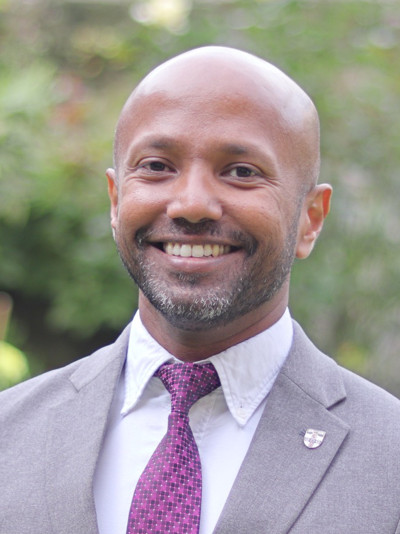
Mark Aloysius
Arendt and Augustine: A Pedagogy of Desiring and Thinking for Politics
I hope that my book makes a modest contribution to political theology by clarifying how Arendt’s understanding of the ‘political’ is indebted to Augustine. Arendt argues in The Human Condition (THC) that the political coalesces around the words and deeds of actors who reveal their interests (inter-esse) in their attempt to overcome conflict and persuade each other to work for the common good. Thus, to be ‘political’ for Arendt includes a pedagogy of desiring and thinking to live inter homines esse. And, as Arendt says in Between Past and Future, Augustine understood politics intimately by virtue of being Roman, for “the language itself came to his help.”
In contrast with a majority of readings which either sanitize Augustine’s theology in her writings or correct her ‘misreadings’ of Augustine, I suggest that a better way of reading Arendt’s engagement with Augustine is to read it as a colloquy between friends who emphasize two modes of the good life – i.e. the vita activa (life of action) and the vita contemplativa (life of contemplation) – and its connection to the ‘political.’
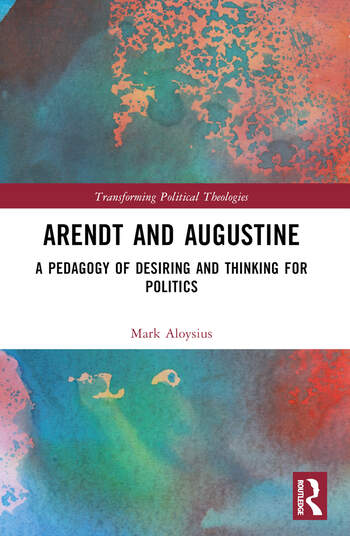
In my book, I trace how Arendt’s early criticism of the denigration of the vita activa by Augustinian love evolves into a mature consideration of the ways in which his theological epistemology helps her consider the relevance of thinking to the ‘political.’ Indeed, each time Arendt laments the destruction of the ‘political’ and considers its rehabilitation through natality, Arendt cites Augustine’s City of God: “that there might be a beginning, [the human] was created.”
Consequently, by drawing on the spirituality of my Jesuit order, I show that Arendt’s most significant contribution to political theory is to provide the theoretical framework that links learning to live in solidarity with others in the vita activa to the cultivation of solitude in the vita contemplativa.

Silvana Rabinovich
Notes for a Decolonial Political Theology
These days, in the land ‘promised’ by God to Abraham/Ibrahim, we are witnessing the acceleration and expansion of the apocalyptic and genocidal tendencies of a national-settler colonial political theology that is now displaying its cruelest face.
Assuming that there is political theology, I hope that my book Notes for a Decolonial Political Theology will contribute to its decolonization. In its pages, I attempt a counter-hegemonic exercise in ‘the theological-political.’ The book traces some interpretative keys for the liberation of the Hebrew Bible, which have been subjugated by a hermeneutic at the service of national-colonial political theology.
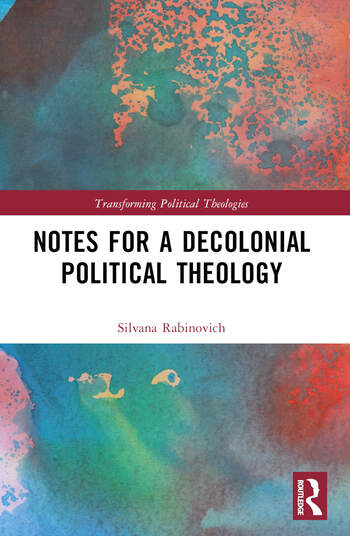
Prejudicelessness and hopes are woven together in a de-orientalizing reading dispositive. Untangling the Abrahamic-Ibrahimic knot from the dispute between Sarah and Hagar is one of the paths to decolonizing the narrative that today underlies territorial dispossession and ethnic cleansing. Another path involves translation as a way of decolonizing language. The pages of this book contain notes and tones in a heteronomous key: the justice of the other who, in the words of the ‘Indian’ prophet, demands through the poet’s words (Mahmoud Darwish):
“So do not bury god in books that promised you a land in our land.”

Lenart Škof (editor)

Emily A. Holmes (editor)

Pavlo Smytsnyuk (editor)
Marian Reflections on War and Peace
This volume, published within the “Transforming Political Theologies” series, brings together Ukrainian and other scholars to explore some of the most pressing issues of our time in an original attempt to think theologically through a Marian lens. It is dedicated to Mary as a symbol of peace and compassion and brings together a series of reflections on trauma, suffering, and related experiences of war. For this purpose, the approaches in this book are both theoretical and practical, with a very strong feminist connotation, including personal narratives, testimonies, and artistic interventions (such as new icons and artworks) from Ukraine.
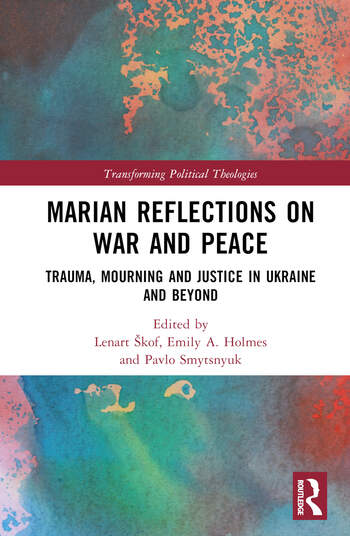
The main potential of transforming political theology is seen in this book, as several of the contributions include personal testimonies, artistic interventions, and other narratives from Ukrainian cities, devastated by war. The book also contributes to trauma theology, being closely related to gender-sensitive and empirical approaches in contemporary political theology. Although the main purpose of this book is to address war, suffering, mourning, and trauma, in its reflections, it also looks towards hope, restoration, and future justice for Ukraine and beyond.
The book thus highlights Marian voices of resistance and liberation – also by looking into other war zones and interreligious contexts, such as the Israel-Palestine or North-South Korean contexts. Critically, the volume also engages with historical and contemporary uses of Mary in various militarized contexts, where the Mother of Jesus is not only protecting the peace, but is appropriated and misused for the contexts of combat, war, and destruction.
One of its main messages is that theology in its ethical, restorative (and, necessarily, interreligious) aspects needs to intervene concretely and timely with its messages and reflections even in the midst of war, and that political theology demands a radicalized ethico-empirical and gender-sensitive approach.

Joshua Mauldin (editor)
Political Theology in Chinese Society
I recall taking a course in graduate school taught by the theological ethicist, Theodore Walker. Early in the semester, Professor Walker gave us some advice about how to read a book, which included the seemingly obvious but often neglected task (for me, at least) of reading the table of contents. How often had I set out reading a book with no more than a passing glance at the contents page!
So, in recently re-reading Reinhold Niebuhr’s Nature and Destiny of Man, for a course I’m set to teach at Princeton Theological Seminary in spring 2026, I was struck by the title of a section in chapter 4. The chapter’s title is “The Easy Conscience of Modern Man,” which is already pretty striking. But it was the subtitle of the first section that really hit me: “The Effort to Derive Evil from Specific Historical Sources.”
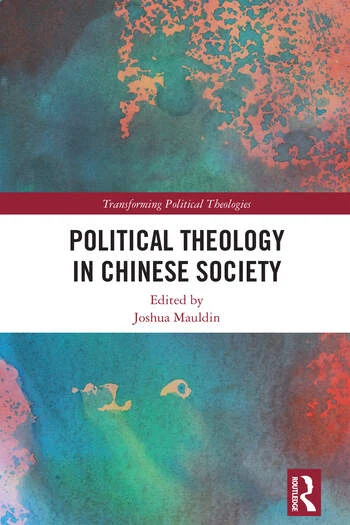
A great deal of work in theology and indeed in the humanities and social sciences more broadly can be summarized under this rubric: an effort to derive evil from specific historical sources. It’s a natural human tendency, according to some, the origin of religion itself: the desire to make sense of the world, to explain how and why things got the way they are. In a secular age, we look to history where an earlier age looked to the gods for answers.
I hope that the book I have edited on Political Theology in Chinese Society will invite readers to look not only to the past to understand the world but also to the future. Because where we have been is not necessarily where we are going. The world is changing rapidly, far more quickly than our historically inclined minds can imagine.
What if we began to think of political theology not in a historicist mode as the working out of events from time out of mind but as the emergence of some new future, which might at once excite us and also terrify us? Whatever else that might do, it surely will transform political theology.

Jane Barter
Theopolitics and the Era of the Witness
This book examines the notion of witnessing — especially in relation to political atrocity and genocide — and how theological modes of witness in Jewish and Christian traditions connect to public, secular forms of witnessing in the twentieth and twenty-first centuries. In the book, I sought to understand how survivor testimony is framed, mediated, and politicized. I also explored theological themes (such as redemption, lament, martyrdom, trauma, and reconciliation) that tacitly inform these processes.
Following Carlota McAllister and Valentina Napolitano, I distinguish theopolitics from political theology. According to this argument, theopolitics is concerned not with sovereignty and power, but with powerlessness, vulnerability, and the “tradition of the oppressed,” as Benjamin called it.
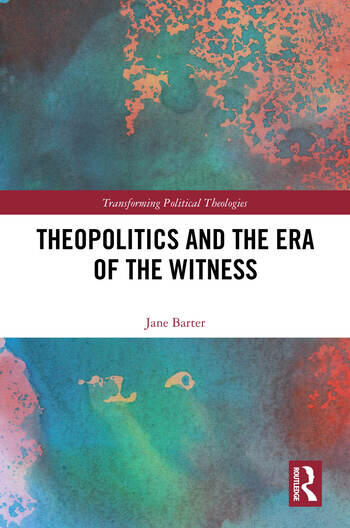
This approach has the potential to transform political theology in several key ways — by shifting its focus and reconfiguring its relationship to memory, power, and suffering. Most classical political theology (e.g., Carl Schmitt, John Milbank) has been preoccupied with sovereignty, authority, and the state, often focused on power structures or the divine legitimation of political order. In its stead, I seek to center a weak messianism—or remnant witnessing. This decentering of power has the potential to reorient political theology toward attentiveness to suffering and the victims of atrocity, rather than toward a redeemed and sovereign futurity.
In the book, I conclude with several examples of what I understand to be remnant witnessing. These are forms of testimony that remain close to the history’s victims and casualties, that forge resistance through efforts at material transformation, and that strive to form solidarities among others who suffer, and thus resist a politics of identity. This renunciatory form of witnessing is exemplified in the family members and allies of Missing and Murdered Indigenous Women and Girls in Canada, in the Khulumani Support Group in South Africa, and in non- and anti-Zionist Jewish organizations such as Jewish Voice for Peace.
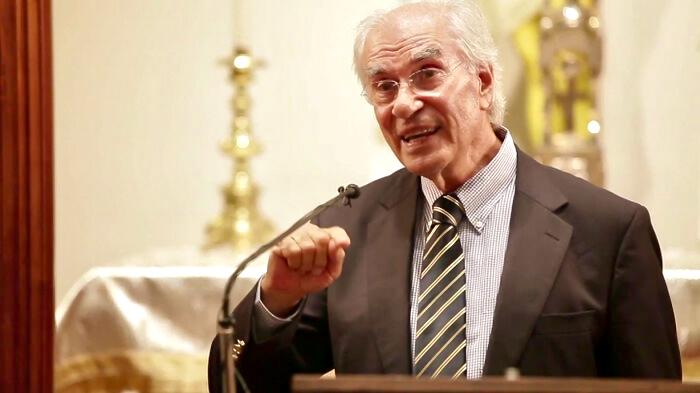
Christos Yannaras

Jonathan Cole (translator, editor)
On the “Meaning” of Politics
I (Cole) hope this book transforms political theology by injecting the questions of ontology and epistemology into a discourse that has hewed too close to exegesis, on the one hand, and ethics, on the other. It is not that these two lenses are irrelevant. On the contrary, they are essential to any political theology worthy of the name. However, Christos Yannaras’ valuable insight is that our intertwined lives in the polis both reflect and shape our ontological and epistemological assumptions. The way we organize society reveals deep, and often subconscious, presuppositions about the nature and telos of reality as we experience it.
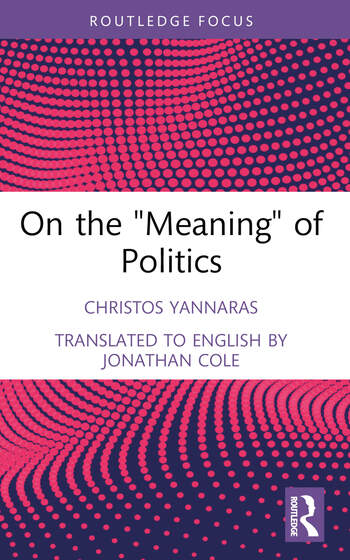
As we are each reared in a particular political context, the contours of that context shape our imaginary and vision of what politics is, could, and should be. The polis, Yannaras informs us, is the primary vehicle through which we come to know reality, namely, through our shared experiences and the shared language we have inherited and refined to articulate it. Contemporary political theology could benefit greatly from taking up Yannaras’ challenge to think ontologically and epistemologically about politics and its connection to theology.
Share This
Share this post with your friends!